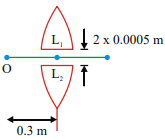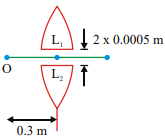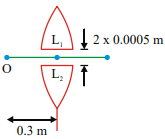Physics-
General
Easy
Question
The convex surface of a thin concav–convex lens of glass of refractive index 1.5 has a radius of curvature of 20 cm The concave surface has a radius of curvature of 60 cm The convex side is silvered and placed on a horizontal surface as shown in the figure A small object is placed on the principal axis of the combination, at a distance of 30 cm in front of the mirror The magnification of the image is



- 5

The correct answer is: 
Related Questions to study
physics-
The convex surface of a thin concav–convex lens of glass of refractive index 1.5 has a radius of curvature of 20 cm The concave surface has a radius of curvature of 60 cm The convex side is silvered and placed on a horizontal surface as shown in the figure The combination behaves like

The convex surface of a thin concav–convex lens of glass of refractive index 1.5 has a radius of curvature of 20 cm The concave surface has a radius of curvature of 60 cm The convex side is silvered and placed on a horizontal surface as shown in the figure The combination behaves like

physics-General
physics-
The convex surface of a thin concav–convex lens of glass of refractive index 1.5 has a radius of curvature of 20 cm The concave surface has a radius of curvature of 60 cm The convex side is silvered and placed on a horizontal surface as shown in the figure The focal length of the combination has the magnitude

The convex surface of a thin concav–convex lens of glass of refractive index 1.5 has a radius of curvature of 20 cm The concave surface has a radius of curvature of 60 cm The convex side is silvered and placed on a horizontal surface as shown in the figure The focal length of the combination has the magnitude

physics-General
physics-
A point object O is placed at a distance of 0.3 m from a convex lens of focal length 0.2m It is then cut into two halves each of which is displaced by 0.0005 m as shown in figure

Separation between the images is
A point object O is placed at a distance of 0.3 m from a convex lens of focal length 0.2m It is then cut into two halves each of which is displaced by 0.0005 m as shown in figure

Separation between the images is
physics-General
physics-
A point object O is placed at a distance of 0.3 m from a convex lens of focal length 0.2m It is then cut into two halves each of which is displaced by 0.0005 m as shown in figure

Number of images found is
A point object O is placed at a distance of 0.3 m from a convex lens of focal length 0.2m It is then cut into two halves each of which is displaced by 0.0005 m as shown in figure

Number of images found is
physics-General
physics-
A point object O is placed at a distance of 0.3 m from a convex lens of focal length 0.2m It is then cut into two halves each of which is displaced by 0.0005 m as shown in figure

Image will be formed from the lens at a distance of
A point object O is placed at a distance of 0.3 m from a convex lens of focal length 0.2m It is then cut into two halves each of which is displaced by 0.0005 m as shown in figure

Image will be formed from the lens at a distance of
physics-General
chemistry-
The major product obtained on interaction of phenol with sodium hydroxide and carbon dioxide is
The major product obtained on interaction of phenol with sodium hydroxide and carbon dioxide is
chemistry-General
chemistry-
Which will not form a yellow precipitate on heating with an alkaline solution of iodine?
Which will not form a yellow precipitate on heating with an alkaline solution of iodine?
chemistry-General
physics-
A bi-convex lens is formed with two thin planoconvex lenses as shown in the figure Refractive index n of the first lens is 1.5 and that of the second lens s 1.2 Both the curved surfaces are of the same radius of curvature R = 14 cm For this bi-convex lens, for an object distance of 40 cm, the image distance will be

A bi-convex lens is formed with two thin planoconvex lenses as shown in the figure Refractive index n of the first lens is 1.5 and that of the second lens s 1.2 Both the curved surfaces are of the same radius of curvature R = 14 cm For this bi-convex lens, for an object distance of 40 cm, the image distance will be

physics-General
physics-
The graph between the lateral magnification (m) produced by a lens and the distance of the image (v) is given by
The graph between the lateral magnification (m) produced by a lens and the distance of the image (v) is given by
physics-General
physics-
A small sphere is attached to a cord and rotates in a vertical circle about a point  . If the average speed of the sphere is increased, the cord is most likely to break at the orientation when the mass is at
. If the average speed of the sphere is increased, the cord is most likely to break at the orientation when the mass is at

A small sphere is attached to a cord and rotates in a vertical circle about a point  . If the average speed of the sphere is increased, the cord is most likely to break at the orientation when the mass is at
. If the average speed of the sphere is increased, the cord is most likely to break at the orientation when the mass is at

physics-General
physics-
Two forces, each equal to  , act as shown in figure. Their resultant is
, act as shown in figure. Their resultant is

Two forces, each equal to  , act as shown in figure. Their resultant is
, act as shown in figure. Their resultant is

physics-General
chemistry-
The reaction given below is called: 
The reaction given below is called: 
chemistry-General
chemistry-
 - butyl alcohol
- butyl alcohol  A True statement about is
A True statement about is
 - butyl alcohol
- butyl alcohol  A True statement about is
A True statement about is
chemistry-General
chemistry-
General formula of primary alcohol is:
General formula of primary alcohol is:
chemistry-General
maths-
If  , then
, then 
If  , then
, then 
maths-General





